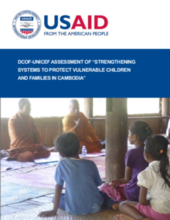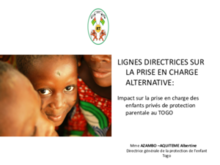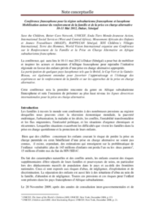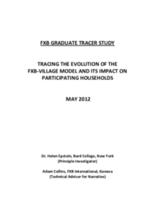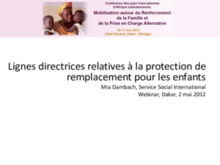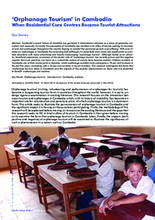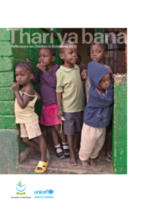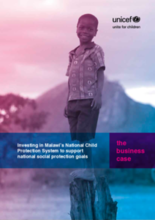Displaying 13061 - 13070 of 14638
This report describes the outcomes of the joint DCOF/UNICEF visit to Cambodia to assess a three-year, DCOF-funded project on Strengthening Systems to Protect Vulnerable Children and Families in Cambodia.
Ceci est une présentation à la Conférence sur le Renforcement de la Famille et la Prise en Charge Alternative en Afrique subsaharienne francophone en Mai 2012 en Dakar, Sénégal.
La conférence, qui aura lieu le 10-11 mai 2012 à Dakar (Sénégal) a pour but de mobiliser et inspirer les acteurs et donateurs d’Afrique francophone pour rejoindre l’initiative régionale en faveur des enfants privés d’une prise e
This paper presents findings from the first-ever study of kinship care in the UK using census micro data.
Study tracing impact of FXB International's community-driven “FXB-Village” model on graduates of the program. The models is a structured program of household support and economic strengthening designed to empower particularly vulnerable families to escape extreme poverty and ensure the enduring wellbeing of the children in their care.
On May 2, 2012, in preparation of the Family Strengthening and Alternative Care Conference for Francophone Sub-Saharan Africa in Dakar, Senegal, BCN and the regional planning committee convened experts and practitioners to present and discuss the efforts to implement the Guidelines for the Alternative Care in the region. Watch this video for presentations, country level experience from Togo, and discussions on the pressing issues facing implementation in the region.
Ceci est une présentation à la Conférence sur le Renforcement de la Famille et la Prise en Charge Alternative en Afrique subsaharienne francophone en Mai 2012 en Dakar, Sénégal.
This research investigates the forms that ‘orphanage tourism’ takes in Cambodia and the impacts of this popular phenomenon on those who are purported to benefit: orphanages and orphans.
Collection of research and reflections on children’s issues in Botswana articles in the various chapters of the publication have been structured to follow the life cycle of the child as she or he grows and is faced with different issues that need to be addressed: young child survival; child development; child protection; HIV and AIDS; and child-sensitive social protection.
The paper argues that investing in Malawi’s emerging national child protection system will support national social protection goals. The Government is bringing together its various responses to child protection and orphans and vulnerable children as the foundation on which to build the national child protection system, with the intention of delivering a coordinated, harmonised and systematic approach to protecting children from violence, abuse, exploitation and neglect.

